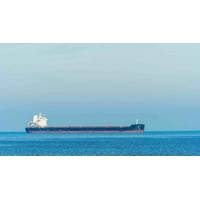Uganda's 'Oil Rush' Town Stuck in the Slow Lane
Before the discovery of large amounts of oil in Lake Albert, Hoima was a forlorn and remote town in Western Uganda, whose main sources of income were farming and the trickle of tourists heading to nearby national parks.
A decade later, an oil-fuelled boom is transforming the town nearest the lake, with smart new office blocks and hotels drawing scores of new businesses and people from engineers to prostitutes to bankers.
But with the east African nation yet to pump a single drop of oil, this rapid development may be premature. Oil executives say production will start in 2018 at the earliest.
"Everybody in the country and the region is looking at Hoima," said Betty Tibesigwa, manager of Rosaline Suites, a new hotel and office complex that is home to Chinese oil company CNOOC's operations in Uganda.
"People from all over the world will be visiting Hoima," she told Reuters enthusiastically. "We're coming in to offer services at the standard one would expect of a town with such promising and booming business."
CNOOC, Britain's Tullow Oil and France's Total are among companies exploring for oil beneath Lake Albert, a pristine body of water in the heart of the Rift Valley estimated to contain crude reserves of 6.5 billion barrels.
The discovery of oil there about 10 years ago unleashed dreams of an economic windfall that would lift Uganda's 38 million people out of poverty but development has proceeded at a snail's pace, stymied by spats over planning and taxes.
CRUDE DREAMS
"Oil comes with its own hype. This investment seems to be way ahead of its time," says Stephen Kaboyo, managing director at Alpha Capital Partners, a leading Ugandan fund manager.
"These investors won't find enough business activity to support them right away. We'll have idle capacity."
Officials are now eyeing 2018 as the start of production, but Kaboyo believes this is still too optimistic, pointing to infrastructure delays such as a $4.5 billion, 1,300 km export pipeline to the Kenyan coast that has not yet been started.
The tender to build a $2.5 billion domestic refinery was awarded only early this year, to Russia's RT-Global Resources, and construction is not expected to start before 2016.
Government economists estimate that developing the oil fields will cost $15-22 billion, against $50 billion that Tullow says the country could earn from crude sales during the lifetime of the Lake Albert fields.
Such sums are exciting investors around Hoima, where a new tarmac highway shimmers westwards through marshes and forests before plunging over an escarpment to the Albertine basin and the border with Democratic Republic of Congo.
Alongside the road, warehouses are springing up in lush green fields, next to banks, motor showrooms, office blocks and shopping malls.
Estate agents estimate land prices have gone up 50 percent in the last four years as speculators have snapped up plots. They anticipate huge demand from a population that has quadrupled since 2002 to 100,000, according to census data.
"I see these two -- food and housing -- as the next growth hotspots in Hoima," said Ddembe Kawaga Setumba, 46, a grain and cereals dealer.
EARLY BIRDS
But the delays in oil production are pushing back the expected payday for investors who have banked on the arrival of oil men ready to splash out on everything from burgers and beer, fancy clothes and electronics, to schooling for their children.
For 40-year-old Godfrey Muleke, who sells and services Renault and Mitsubishi trucks and water pumps and generators, business in the last two years has not been brisk.
Since opening he has sold only 10 Renault trucks and has about 25 off-roader vehicles under management on both lease and rental arrangements.
But he still believes he made the right choice by getting his foot in the door before anybody else.
"Moving in now is good," Muleke told Reuters. "You invest less when you move in early. And you're given a bird's eye view of the scene."
($1 = 2,995 Ugandan shillings) (Editing by Ed Cropley and Catherine Evans)




